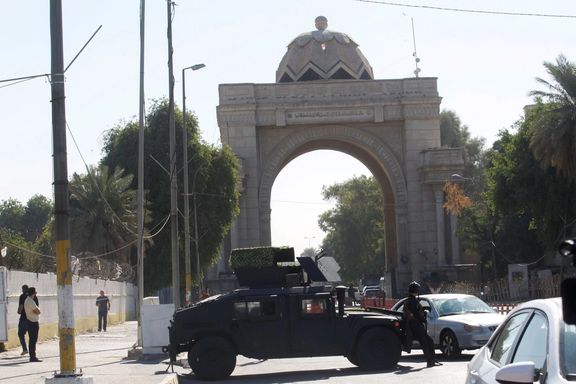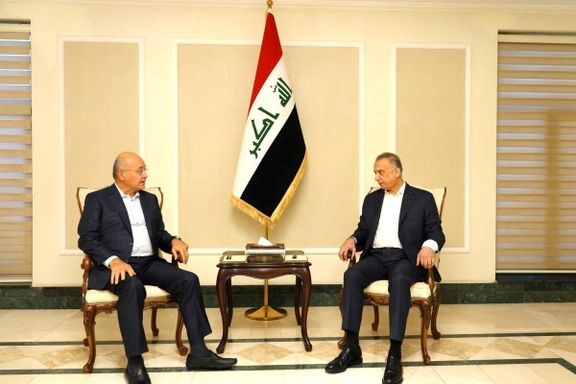Iran Tries To Distance Itself From Assassination Attempt On Iraq's President

Iranian official reactions to the drone attack on the residence of Iraq’s prime minister were meant to deflect any blame and pointing fingers at unknown forces.

Iranian official reactions to the drone attack on the residence of Iraq’s prime minister were meant to deflect any blame and pointing fingers at unknown forces.
Social media users in Iran generally described government reactions to the incident as a way of distancing the Islamic Republic from the attempt.
Al-Kadhimi escaped the attempt and subsequently praised "the steadfastness and determination of Iraq's heroic security forces,” adding that he was "fine and among my people."
While usually the Foreign Ministry is the first to react to such incidents, the spokesman for the ministry was not that quick on Sunday and his reaction came hours past mid-day in Tehran. Saeed Khatibzadeh categorically condemned the attack and repeated Iran's formulaic statement about "Tehran's support for continued peace and stability in Iraq."
Iran's national security chief Ali Shamkhani who was quick to respond to the news, in an early morning tweet accused "foreign think tanks" of being behind the attack. Shamkhani condemned the attack, calling it "a new sedition".
Most of more than 140 Twitter users who commented on Shamkhani's tweet said, in one way or another, that the tweet was an effort to distance Iran from the attempt while many in Iran and Iraq saw the Islamic Republic's hand somewhere in the story.

Iranian dissident scholar in France Mohammad Javad Akbarin, for instance, charged: "You wrote this tweet because you probably know that everyone knows who was behind the attack.” Akbarin also mentioned some characteristic indications in the tweet that pointed fingers at Tehran.
Iranian blogger Hamid Moeeni wrote: "When you define your strategic depth based on religion and have a special IRGC unit for it with a lot of mercenaries and take pride in your pictures being on billboards in another country, then you have to wait for such allegations. At least think of the probability of your own think tanks also being infiltrated by foreign think tanks!"
Meanwhile, Noor News, a website close to Shamkhani and Iran's Supreme Council of National Security characterized the assassination attempt as "suspicious," and an attempt to overshadow the work of the fact-finding committee that is looking into a clash between security forces and pro-Iran demonstrators on Friday.
Iran's proxy groups in Iraq who rejected the outcome of the latest parliamentary elections had threatened to take revenge. Abu Ali Al-Askari one of the figureheads of pro-Iran Kataib Hizballah said following the assassination attempt that Al-Kadhimi was pretending to be a victim in a bid to win more popularity.
Muqtada Al-Sadr, whose group won the elections called for security forces to take full control of Iraq – a thinly-veiled jab at pro-Iran militias. He reiterated his call for ending foreign influence in Iraq, also a reference to Iran. Another Iraqi figurehead Ammar Hakim also condemned the attack. Most current and former Iraqi officials including President Barham Salih and Al-Nasr Coalition Leader Hayder al-Ibadi also denounced the assassination attempt.
Noor News said that "the quick reaction of some pro-Western groups following the attack makes the event look even more suspicious," but did not explain why and did not name those groups.
In Iran, IRGC-linked news agencies Fars and Tasnim carried factual reports of the Sunday morning attack and summed up the reactions in Iran without mentioning the backdrop of hostilities of which Iran and the IRGC are known to be a part of.
The administration-owned news agency ISNA reported that Foreign Minister Hossein Amir-Abdollahian has called his Iraqi counterpart Fuad Hussain to ask about the prime minister's good health. ISNA quoted Amir-Abdollahian as saying that the attack was carried out by "sinister elements."
Official news agency IRNA featured an extensive report about the drone attack on Al-Kadhimi's residence asking whether the United States was behind the attack, but stopped short of explaining why the US would want to harm a leader who has good relations with Washington. IRNA attributed the conspiracy question to un-named Iraqi groups.
Meanwhile, it quoted a controversial Iraqi commentator as charging that US forces did not activate the anti-aircraft system over Baghdad’s green zone to stop the attack. Generally, IRNA blamed many groups and regional media outlets for being behind the attack, without mentioning pro-Iran groups. Instead, the agency quoted several pro-Iran militia leaders pointing fingers at foreign countries and media outlets.